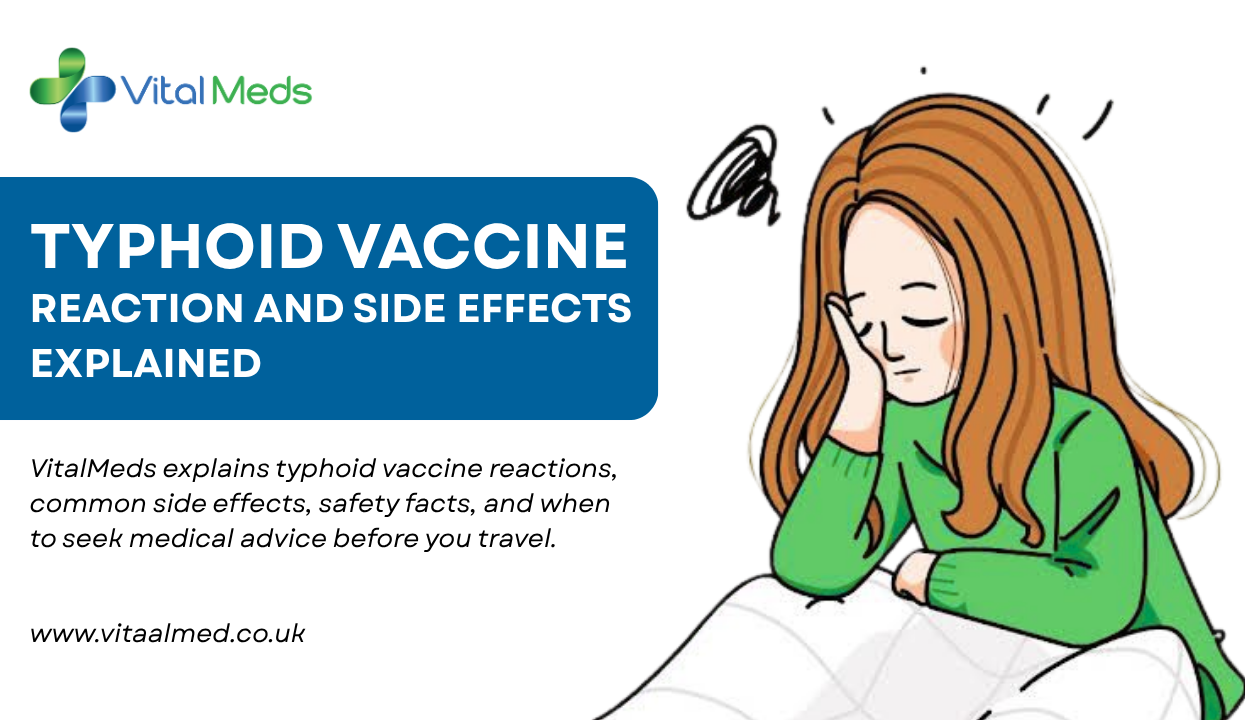- Your cart is empty
- Continue Shopping
Typhoid Vaccine Reaction and Side Effects Explained

Typhoid Vaccine Reaction remains a significant health risk in many parts of the world, particularly in South Asia, Africa, and parts of Latin America. Travellers from the United Kingdom visiting these regions are strongly advised to receive a typhoid vaccination before departure. While the vaccine is generally safe and effective, it is natural for people to have questions about possible side effects and what reactions they may experience afterwards.
This guide from VitalMeds explains what to expect after a typhoid vaccine, the difference between normal and serious reactions, and practical steps for managing any side effects. Our goal is to provide clear, medically accurate, and traveller-friendly information so you can feel confident and prepared.
What Is the Typhoid Vaccine and Why Is It Important?
Typhoid fever is caused by the bacterium Salmonella Typhi, which spreads through contaminated food or water. The illness can lead to prolonged fever, abdominal pain, diarrhoea, and in severe cases, serious complications such as intestinal perforation.
Vaccination is the most effective way to reduce your risk, especially when travelling to areas where typhoid is common. The vaccine does not provide 100% protection, but it significantly lowers the chance of infection and reduces the severity if you do become ill. Safe food and water practices should still be followed after vaccination.
Types of Typhoid Vaccines Available
In the UK, there are two main types of typhoid vaccines available:
- Injectable (Vi polysaccharide) vaccine
- Given as a single injection into the upper arm.
- Suitable for adults and children aged two years and above.
- Provides protection for around three years.
- Often recommended for most travellers.
- Oral (live attenuated) vaccine
- Given as a series of three capsules taken on alternate days.
- Suitable for adults and children over six years old.
- Provides protection for around one year.
- Not suitable for people with weakened immune systems or those taking certain antibiotics.
Both vaccines are effective, but your travel health professional will recommend the most appropriate option based on your medical history, age, and travel plans.
Typhoid Vaccine Reaction
After vaccination, some people may experience mild and short-lived reactions. These are usually a sign that the immune system is responding to the vaccine, helping your body build protection against the typhoid bacteria.
It is important to distinguish between expected mild reactions and rare, serious adverse events. Mild side effects are common and usually resolve within a few days without treatment. Serious reactions are very uncommon and require medical attention.
Common Reactions After Typhoid Vaccination
1. Injection Site Reactions (Injectable Vaccine)
- Pain, redness, or swelling where the injection was given.
- Occurs in about 1 in 3 to 1 in 5 people.
- Usually mild and lasts 1–2 days.
- Applying a cool compress can help ease discomfort.
2. Fever or Mild Temperature Rise
- A low-grade fever (below 38°C) may develop within 24 hours.
- Often resolves without medication.
- You can take paracetamol if you feel uncomfortable, following dosage instructions.
3. Headache and Tiredness
- Temporary tiredness, headache, or general feeling of being unwell can occur.
- These symptoms are usually mild and pass within 48 hours.
4. Muscle Aches
- Some people experience muscle or joint pain for a short time after vaccination.
- Rest and fluids usually help.
Common Reactions After the Oral Typhoid Vaccine
The oral vaccine (given as capsules) can cause mild digestive symptoms, including:
- Nausea or mild stomach cramps.
- Diarrhoea or loose stools.
- Mild rash or skin irritation (rare).
These symptoms are temporary and usually resolve within 24–48 hours. It is important to take the capsules exactly as instructed and complete the full course for maximum protection.
Rare and Serious Reactions
Serious side effects from the typhoid vaccine are extremely rare. However, seek immediate medical advice if you experience any of the following:
- Difficulty breathing or swallowing.
- Swelling of the face, lips, tongue, or throat.
- Severe rash, itching, or hives.
- High fever (above 39°C) that does not settle.
- Persistent vomiting or abdominal pain.
- Confusion or dizziness.
These may indicate an allergic reaction or another underlying issue that needs urgent care. Always report such reactions to your healthcare provider or local emergency services.
When to Seek Medical Advice
Most vaccine reactions are mild and self-limiting. You should contact your GP, pharmacist, or travel clinic in Manchester if:
- Symptoms persist beyond 3 days.
- You develop severe pain, swelling, or redness at the injection site.
- You feel unwell and unsure whether the symptoms are related to the vaccine.
If you experience difficulty breathing, swelling of the throat, or collapse after vaccination.
How to Manage Common Typhoid Vaccine Reactions
- Stay hydrated: Drink plenty of fluids, especially if you feel feverish.
- Rest: Give your body time to recover after vaccination.
- Pain relief: Paracetamol or ibuprofen can reduce mild fever or soreness (if safe for you to take).
- Cool compress: Apply to the injection site for comfort.
- Monitor symptoms: Most resolve within two days; if they persist, contact a healthcare provider.
Avoid alcohol for at least 24 hours after vaccination, as it can worsen dehydration or side effects.
Typhoid Vaccine and Travel Timing
You should ideally receive your typhoid vaccination at least two to three weeks before travelling, as it takes time for immunity to develop. This also allows any mild side effects to settle before departure.
If you are also receiving other travel vaccines (such as hepatitis A or yellow fever), your travel health professional may coordinate timing to reduce overlapping side effects and ensure best protection.
Who Should Not Receive the Typhoid Vaccine
The Typhoid Vaccine Reaction may not be suitable for everyone. You should discuss your medical history with a healthcare professional if you:
- Have had a severe allergic reaction to a previous dose.
- Have a fever or severe illness at the time of vaccination.
- Have a weakened immune system due to illness or medication.
- Are pregnant or breastfeeding (the injectable vaccine is usually preferred).
- Are taking antibiotics (may interfere with the oral vaccine).
Always follow medical guidance specific to your circumstances.
Long-Term Protection and Booster Doses
- The injectable vaccine provides protection for about three years.
- The oral vaccine offers protection for around one year.
You may need a booster dose if you continue to travel to typhoid-endemic areas or live in a region where exposure risk remains high.
Consult your GP or travel health clinic for personalised advice on when to get your next booster.
Myths and Misconceptions About Typhoid Vaccine Reaction
“The vaccine can give you typhoid.”
False. The injectable vaccine contains an inactivated form of the bacteria that cannot cause disease. The oral vaccine uses a weakened strain that does not cause typhoid in healthy individuals.
“Everyone feels ill after vaccination.”
Most people experience little to no reaction. When symptoms occur, they are generally mild and short-lived.
“You don’t need the vaccine if you’re careful with food.”
Even careful travellers can be exposed to typhoid through ice, raw vegetables, or contaminated water. Vaccination provides an extra layer of protection.
“You only need the vaccine once.”
Immunity fades over time, so boosters are recommended every one to three years depending on the vaccine type.
Tips for Safe Travel After Vaccination
Even with vaccination, practising good hygiene and food safety is vital:
- Drink bottled or boiled water.
- Avoid ice in drinks.
- Eat freshly cooked food.
- Wash hands frequently, especially before eating.
- Avoid raw fruits or salads that may have been washed in unsafe water.
Following these precautions, along with timely vaccination, gives you the best protection against typhoid fever.
Professional Advice and Support from VitalMeds
At VitalMeds, our qualified healthcare professionals provide comprehensive travel health consultations, including typhoid vaccination, advice on side effects, and guidance on other recommended travel vaccines.
We follow the latest NHS and Public Health England recommendations to ensure your travel health plan is safe, effective, and tailored to your journey.

